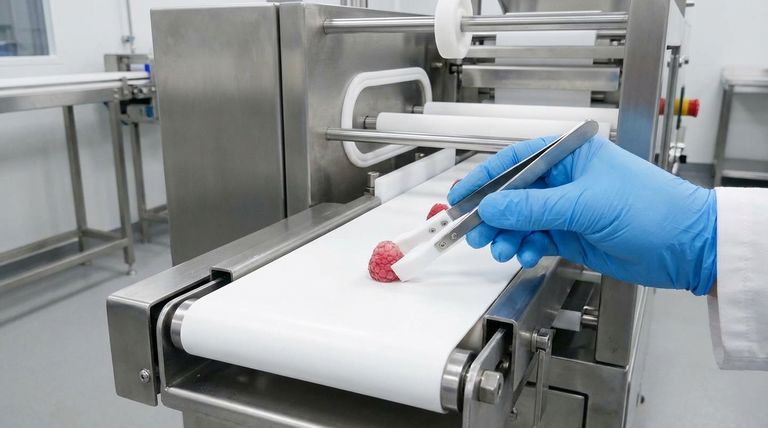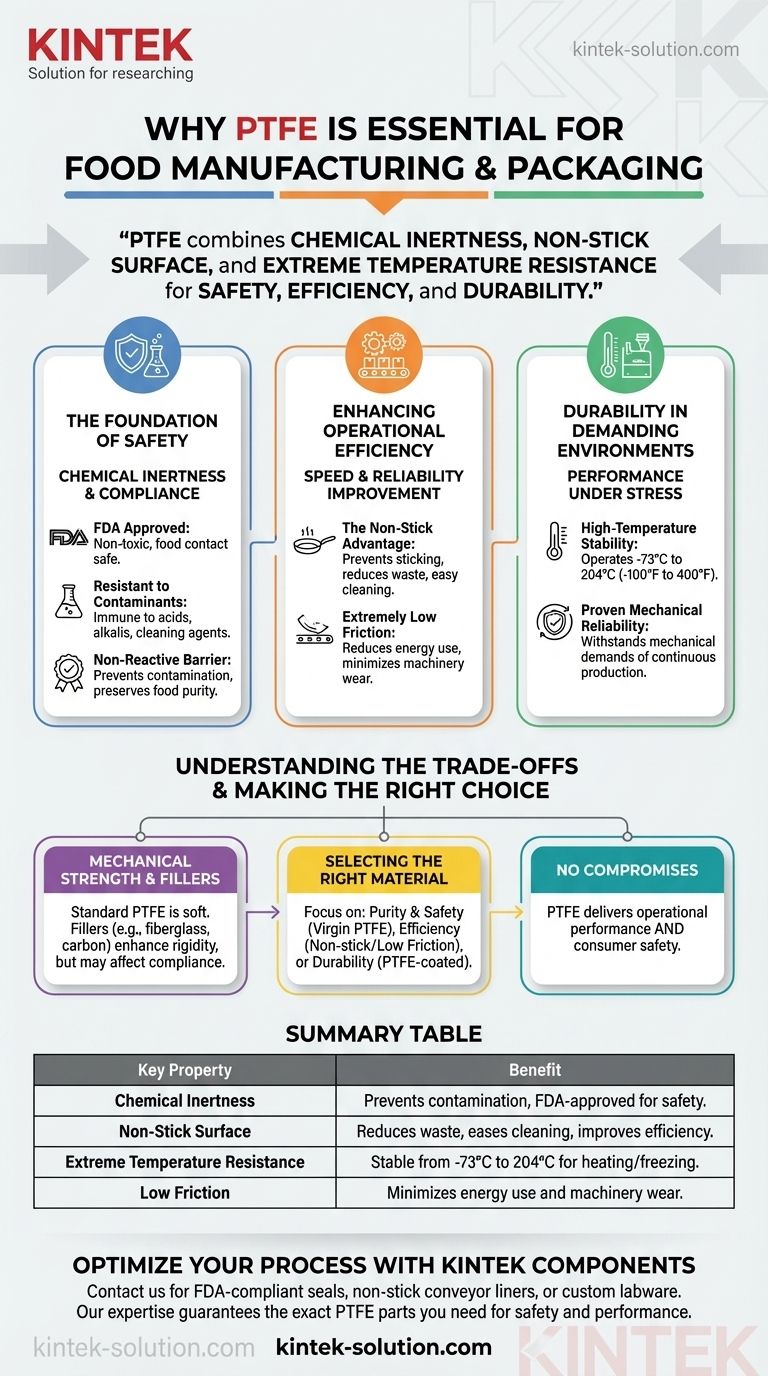At its core, Polytetrafluoroethylene (PTFE) is suitable for food manufacturing and packaging because it combines three critical properties: it is chemically inert and non-toxic, it possesses an exceptional non-stick surface, and it can withstand the extreme temperatures common in food processing. This unique combination ensures that PTFE components will not contaminate food products while simultaneously improving the efficiency and reliability of production lines.
The fundamental reason for PTFE's widespread use in the food industry is its ability to be both completely safe for food contact and exceptionally high-performing in demanding industrial environments, solving challenges of safety, efficiency, and durability simultaneously.

The Foundation of Safety: Chemical Inertness and Compliance
In any food-related application, the primary concern is preventing contamination. PTFE's molecular structure makes it one of the most non-reactive materials available, which is the cornerstone of its value in this industry.
FDA Approval and Food Grade Compliance
PTFE is approved by the FDA for food contact applications. This certification confirms that the material is non-toxic and that its components will not migrate into food products, ensuring consumer safety.
This compliance makes it a pre-approved, trusted choice for engineers and designers creating machinery for food processing.
Resistance to Contaminants and Staining
PTFE is virtually immune to all chemicals, including the strong acids, alkalis, and organic solvents found in food products and aggressive cleaning agents.
This means it will not corrode, degrade, or leach harmful substances. It also resists staining, which helps maintain a hygienic environment.
A Non-Reactive Barrier
When used for components like gaskets and seals, PTFE’s inert nature creates a perfect barrier. It ensures that nothing from the machinery contaminates the product, preserving the purity, taste, and quality of the food.
Enhancing Operational Efficiency
Beyond safety, PTFE directly improves the speed and reliability of manufacturing processes. Its unique surface properties minimize friction and prevent adhesion, which are common sources of production delays.
The Non-Stick Advantage
PTFE has an extremely low surface tension, giving it its famous non-stick quality. In packaging, this prevents melted plastics, adhesives, and printing inks from sticking to heat-sealing bars and transport belts.
In food processing, this property ensures that sticky ingredients release easily from surfaces, reducing product waste and minimizing the need for frequent, time-consuming cleaning.
Extremely Low Friction
The material has one of the lowest coefficients of friction of any solid. When used in components like conveyor belts, chutes, or valve parts, this reduces the energy needed to move products and minimizes wear and tear on machinery.
This low-friction movement results in smoother, more reliable operations with less maintenance.
Durability in Demanding Environments
Food production facilities are harsh environments, often involving extreme temperatures and repetitive mechanical stress. PTFE is engineered to perform reliably under these conditions.
High-Temperature Stability
PTFE can operate continuously across a very broad temperature range, typically from -73°C to 204°C (-100°F to 400°F).
This makes it ideal for applications involving both freezing and heating, such as oven conveyors, ink drying systems, and heat-sealing equipment, without degrading or losing its key properties.
Proven Mechanical Reliability
While inherently non-reactive, PTFE's physical durability is critical. Its use in transport belts and other moving parts demonstrates its ability to withstand the mechanical demands of continuous production lines.
Understanding the Trade-offs
While highly effective, it's important to understand the specific limitations of PTFE to ensure it is applied correctly.
Mechanical Strength
Standard, unfilled PTFE is a relatively soft material. While durable, it is not intended for high-load structural applications and can be susceptible to deformation under high pressure, a phenomenon known as "creep."
Enhancing Performance with Fillers
To overcome its mechanical limitations, PTFE is often blended with fillers like fiberglass or carbon. These additives significantly increase its rigidity and wear resistance, but they may alter other properties, such as its chemical resistance or regulatory compliance for direct food contact. The specific grade must be chosen carefully.
Abrasion Resistance
Pure PTFE can be damaged by highly abrasive materials. In applications involving coarse powders or sharp ingredients, a filled grade of PTFE or an alternative material might be a more suitable choice.
Making the Right Choice for Your Application
Selecting the right material requires matching its properties to your primary goal.
- If your primary focus is product purity and safety: Rely on FDA-compliant virgin PTFE for any surface in direct contact with food, such as gaskets, seals, and linings.
- If your primary focus is process efficiency and reduced downtime: Leverage PTFE's non-stick and low-friction properties on conveyor belts, heat sealers, and rollers to ensure smooth product flow and easy cleanup.
- If your primary focus is durability in high-heat processes: Utilize PTFE-coated components in ovens, dryers, and sealing equipment where its exceptional thermal stability is paramount.
Ultimately, PTFE's value comes from being a material that asks for no compromises between operational performance and consumer safety.
Summary Table:
| Key Property | Benefit in Food Manufacturing |
|---|---|
| Chemical Inertness | Prevents contamination, FDA-approved for safety |
| Non-Stick Surface | Reduces waste, eases cleaning, improves efficiency |
| Extreme Temperature Resistance | Stable from -73°C to 204°C for heating/freezing processes |
| Low Friction | Minimizes energy use and machinery wear |
Optimize your food manufacturing process with precision-engineered PTFE components from KINTEK.
Whether you need FDA-compliant seals, non-stick conveyor liners, or custom labware for high-temperature applications, KINTEK delivers solutions that prioritize product purity and operational efficiency. Our expertise in custom fabrication—from prototypes to high-volume orders—ensures you get the exact PTFE parts your operation requires.
Contact us today to discuss how our PTFE components can enhance safety and performance in your food, semiconductor, medical, or industrial applications.
Visual Guide

Related Products
- Custom PTFE Parts Manufacturer for Teflon Parts and PTFE Tweezers
- Custom PTFE Parts Manufacturer for Teflon Containers and Components
- Custom PTFE Square Trays for Industrial and Laboratory Use
- Custom PTFE Bottles for Diverse Industrial Applications
- Custom PTFE Measuring Cylinders for Advanced Scientific and Industrial Applications
People Also Ask
- Why is CNC machining preferred for Teflon parts over other methods? Unlock Precision & Complex Designs
- What are the key advantages of PTFE? Unmatched Performance for Extreme Environments
- What are the best practices for achieving tight tolerances in Teflon (PTFE) machining? Master Precision for Demanding Applications
- Why is PTFE rod suitable for automotive applications? Boost Vehicle Performance & Durability
- What tips can improve Teflon machining results? Master Sharp Tools, Heat Control, and Rigid Support



















